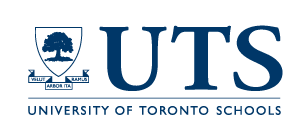What is a Co-Curricular Record?
What is the CCR?
The CCR highlights student achievements in opportunities beyond the classroom at UTS including a brief description and the skills developed (aligned with the 6Cs: Collaboration, Creativity, Critical Thinking, Communication, Citizenship, Character) The purpose of the CCR is to demonstrate the value of engaging in opportunities beyond the classroom, and to help students reflect on and articulate the skills they developed.
Reflective Tool
Students can print an "Unofficial Co-Curricular Record" as soon as they have been recognized for at least one opportunity. Students can print a secure PDF through the CCR website (ccr.utschools.ca) and use it as a tool to think about:
Students can print an "Unofficial Co-Curricular Record" as soon as they have been recognized for at least one opportunity. Students can print a secure PDF through the CCR website (ccr.utschools.ca) and use it as a tool to think about:
-
What have I been involved in?
-
How would I talk about that experience and the skills I developed?
Students can use their CCR to help them write future applications, cover letter, resume, personal statements, or prepare for an interview. They can also bring it to guidance meetings and classes to help explore their interests, skills, and passions. Official Record Students can also print their "Official Co-Curricular Record". Signed by the school Principal and Head of Student Life, students can use their new official integrated record when applying to University programs or part-time jobs, or for scholarships and awards.
Criteria
The Student Life Office will use the following criteria to review opportunities for inclusion on the CCR:
- Must have a clear connection to the UTS Co-Curricular Handbook
- Must incorporate the UTS Charter outlined in the Handbook and follow any policies and procedures described in the Guidebook and Guiding Principles
- Must be capable of being validated by a recognized member of the UTS faculty or staff
- Must enhance at least one of the 6 identified competencies and transferable skills
- Must provide an opportunity for active engagement
- Positions or activities that are primarily symbolic, and do not require significant programming and duties, will not qualify to be listed
- Must require at least 15 hours of work within a single academic year
Each opportunity highlights "what is required to have this opportunity validated." For example: students must attend any training (if necessary), 80% of meetings or practices, submit a reflection, and complete role for if required. Once students have completed the opportunity, the staff or faculty validator will add it to their record. Only opportunities where students have completed the validation requirements will appear on the record. There are three validation deadlines in the year (dates may be flexible). Students will be validated in the term that the opportunity ends:
Opportunities completed in Fall: January 15
Opportunities completed in Winter: April 15
Opportunities completed in Spring : June 15
Opportunities completed in Winter: April 15
Opportunities completed in Spring : June 15
Competencies
Each opportunity can have up to 3 competencies attached to it. These competencies will appear on a students' record. Below is the list of competencies and their definitions based on the above existing frameworks:
Deep Learning Competencies (NPDL)
Creativity: Having an entrepreneurial eye for economic and social opportunities, asking the right inquiry questions to generate novel ideas, and leadership to pursue ideas and turn them into action.
Communication: Communicating effectively with a variety of styles, modes, and tools (individual digital tools) tailored for a range of audiences.
Citizenship: Thinking like global citizens, considering global issues based on a deep understanding of diverse values and worldviews, and with a genuine interest and ability to solve ambiguous and complex real-world problems that impact human and environmental sustainability.
Critical Thinking: Critically evaluating information and arguments, seeing patterns and connections, constructing meaningful knowledge, and applying it in the real world.
Character: Learning to deep learn, armed with the essential character traits of grit, tenacity, perseverance, and resilience; and the ability to make learning an integral part of living.
Collaboration: Work interdependently and synergistically in teams with strong interpersonal team-related skills including effective management of team dynamics and challenges, making substantive decisions together, and learning from and contributing to the learning of others.
